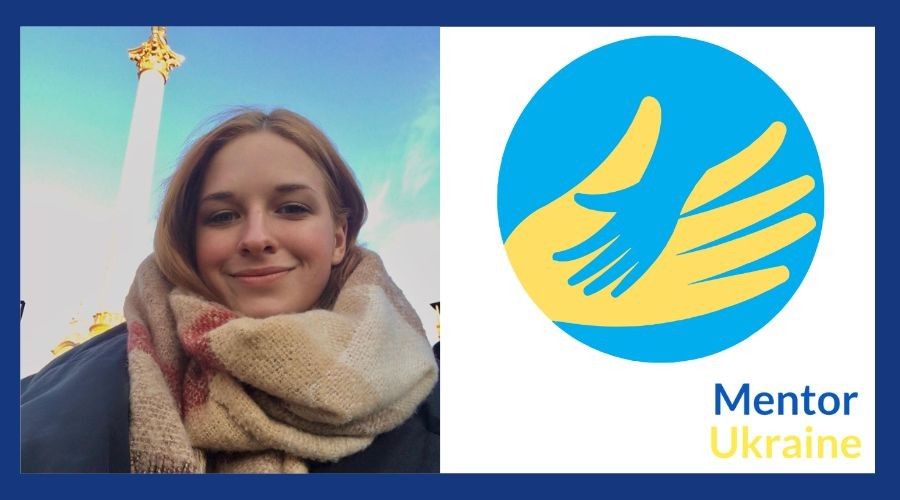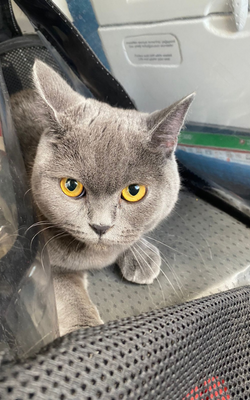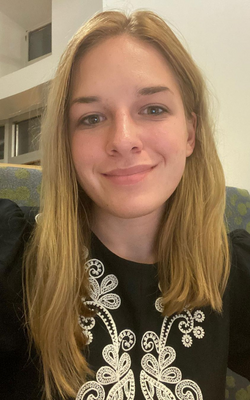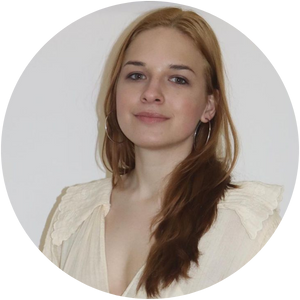Tanya Kotelnykova on Founding Mentor Ukraine and Speaking Up For Ukrainian Students
Tanya, a recipient of Columbia’s Scholarship for Displaced Students, founded a mentorship program for Ukrainian students who want to continue their education during the war. Her goal is to prepare a new generation of Ukrainians to play an integral part in their country’s post-war reconstruction.

Tetiana (Tanya) Kotelnykova (GSAS ’23) fled Ukraine during the 2022 Russian military invasion. She initially entered Western Europe, then came to the United States to study human rights after being awarded Columbia’s Scholarship for Displaced Students. Now, Tanya is trying to help other Ukrainians who want to continue their education during the war, by connecting them with student mentors around the world.
Her new project Mentor Ukraine launched in September 2022 and has already attracted hundreds of applicants seeking a mentor and hoping to continue their studies. Mentors support students with personal statements, share advice about the application process, work with them to improve their English proficiency, build professional networks, and discuss the pros and cons of different majors and fields of study.
The war has prevented many students from continuing their education. Through the mentorship program, Tanya hopes to prepare a new generation of Ukrainians to play an integral part in their country’s post-war reconstruction.
“I believe that young people who want to start outside of Ukraine need to have the opportunity to go out, to study, to actually recover… These people in many years can rebuild Ukraine.”
“My own difficulties and challenges have inspired me to help other people,” Tanya said. “I believe that young people who want to start their adult life outside of Ukraine need to have the opportunity to go out, to study, and to actually recover.”
She noted that many Ukrainian young people face “psychological problems and pressure,” including depression and PTSD, from living in a warzone. These challenges are an obstacle in pursuing their educational goals. Tanya believes that meeting with a mentor to focus on academics can be a source of hope and a mental break from thinking about the war. “Most of us wouldn't think of applying to college as a break, but I think for people it is, the other reality is the war,” Tanya said.

Speaking of Ukranian students who get the opportunity to pursue their education and heal, Tanya shared her conviction that “these people in many years can rebuild Ukraine…. I'm sure we will be able to do it.”
The biggest challenge Tanya has faced in building the mentorship program is that the number of mentee applications greatly outnumber the mentor applications thus far. The mentors who have come forward are from a variety of backgrounds – some are Ukrainian and, like Tanya, are inspired by their own experiences. Others are classmates studying human rights, and all feel a sense of solidarity and empathy and want to connect.
Several student mentors are U.S. Veterans. “They know how it is, how war influences people,” Tanya explained. “They want to help other people.”
“A lot of people think they cannot be a mentor because they don't know how to speak Russian or Ukrainian,” Tanya said. “All our participants from Ukraine have or are studying for English test certificates because they’re applying to universities that require it.” She also stressed that the time requirement is manageable, and typically mentor/mentee matches spend about an hour, weekly, meeting with their mentees.
Her program already has several success stories: Mentees Svitlana Kukharuk and Olha Polishchuk have already received scholarships for the Spring semester of 2023, and another student was admitted to summer school at Yale for summer 2023. More than 150 participants applied for scholarships this fall and many are awaiting admissions decisions.
“Most of us wouldn't think of applying to college as a break, but I think for people it is, the other reality is the war.”
She is hopeful that more mentors will apply, and her ultimate goal is to expand the mentorship network and to include students from other countries touched by global crises, like Syria and Afghanistan. She also hopes to expand the program to encompass more language learning resources, funding for English language certifications and therapy, and to create an app where community members can connect. “I have spent my own money on websites and posters,” Tanya said.
In the classroom, Tanya is also focused on the impact of the Russian invasion on Ukrainian students. Her research is focused on Russian educational policies in schools in the occupied part of Eastern Ukraine since 2014. Tanya has seen first-hand how influential changes to the curriculum affect young people.

When Tanya fled Ukraine last year, it was the second time she’d left her home. She first fled her hometown in Eastern Ukraine and relocated to Kyiv in 2014. At the time, she was 14-years-old and wanted to continue her education outside the Russian occupied territory.
“I was in occupied territory for some months when it started, so I remember how it started. Then, I communicated with my friends, with people who live there.” She traveled back and forth between Kyiv and the occupied part of Ukraine to visit her family frequently.
She summarized her concerns about Russian education policy and what drives her to study this topic:
“If we learn how Russia influences people and understand the propaganda, we can counter. But if we don't study it, how can we counter it? It’s been eight years of occupation in my hometown, so let's imagine a person who went to the first grade of school and now this person is in ninth grade, and assume they finish secondary school with a different language and history… When this territory is returned to Ukraine, you can’t just come and say, ‘oh, forget this language, forget this history.’ You need to do it gently. We need to find ways to connect with people who have been living under occupation for almost 9 years.”
At Columbia, Tanya is excited to continue building her mentorship program and sharing her personal and academic expertise on Ukraine. She’s received support from classmates and professors, both for her mentorship program and personally, and Professor Jackie Dugard and Gergana Halpern at the Institute for the Study of Human Rights are two of her biggest supporters at Columbia. She also shared that some people are hesitant to ask about her background and experiences in Ukraine.
“It’s always difficult to tell all this, but every time it's easier. My life has been influenced by Russian military aggression since childhood. I faced two wars, and I have to share about what Russia has done, so people know.”

Tetiana (Tanya) Kotelnykova is a Masters’ student studying Human Rights in the Graduate School of Arts and Sciences. She is the founder of Mentor Ukraine and a recipient of Columbia University’s Scholarship for Displaced Students.
